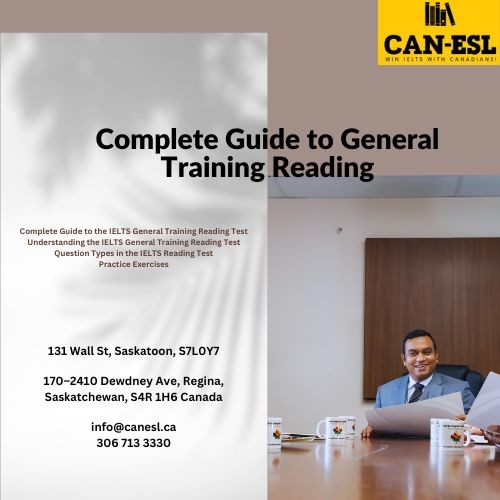
Complete Guide to the IELTS General Training Reading Test
Uploaded

IELTS Listening
18-Aug-2024
IELTS Listening
Complete Guide to the IELTS General Training Reading Test
Preparing for the IELTS General Training Reading Test can
feel overwhelming, but with the right guidance, you can navigate this challenge
with confidence. Whether you're curious about the test format, question types,
or effective study methods, this comprehensive guide will equip you with all
the information you need to excel.
Understanding the IELTS General Training Reading Test
The IELTS General Training Reading Test is designed to
assess your ability to understand and interpret texts commonly encountered in
daily life. The test consists of three sections and lasts for 60 minutes,
during which you will answer a total of 40 questions.
Section Breakdown:
- Section
1: Focuses on social situations. You'll encounter texts such as
advertisements, notices, and brochures. This section evaluates your
comprehension of everyday materials.
- Section
2: Examines workplace-related texts like job descriptions, training
manuals, and company policies. It assesses your ability to understand
work-related documents.
- Section
3: Features a longer, more complex text on a topic of general
interest. This section challenges you to analyze and interpret detailed
information.
Texts are drawn from various sources, including books,
newspapers, magazines, advertisements, and manuals. They are intended for a
general audience, and while some may include technical terms, a glossary will
be provided if necessary.
Question Types in the IELTS Reading Test
The Reading Test includes 11 distinct types of questions,
each designed to test different reading skills. Here’s a breakdown of what to
expect:
- Multiple
Choice: Choose the correct answer from a list of options.
- Identify
Information (True/False/Not Given): Determine if information is true,
false, or not given in the text.
- Identify
the Author’s Views (Yes/No/Not Given): Decide if statements reflect
the author’s views.
- Matching
Information: Match pieces of information to specific sections of the
text.
- Matching
Titles: Match headings or titles to paragraphs.
- Matching
Features: Match features with their descriptions.
- Sentence
Completion: Complete sentences using words from the text.
- Summary
Completion: Fill in gaps in a summary of the text.
- Note/Table/Flowchart
Completion: Complete notes, tables, or flowcharts with information
from the text.
- Diagram
Labeling: Label diagrams based on information in the text.
- Short
Answer Questions: Provide brief responses based on the text.
Practice Exercises
Familiarizing yourself with the test format through practice
exercises can be incredibly beneficial. Here are a couple of examples:
- Identify
Information
- Text
Excerpt: Marie Curie, born Maria Sklodowska in 1867, won Nobel Prizes
in Physics and Chemistry. She was the first woman to win a Nobel Prize.
- Question:
Marie Curie’s husband was a joint winner of both Marie’s Nobel Prizes.
- Complete
the Sentence
- Text
Excerpt: Marie Curie discovered that thorium had the same property as
uranium.
- Question:
When uranium was discovered to be radioactive, Marie Curie found that the
element called _______________ had the same property.
Tips for Success
Maximizing your performance on the IELTS General Training
Reading Test involves effective time management and strategic reading. Here are
some tips to help you succeed:
- Time
Management: Aim to spend about 20 minutes on each section. If you get
stuck, move on and return if time permits.
- Preview
the Text: Skim through the text to get an overview before diving into
the questions. Focus on headings and key points.
- Focus
on Introductions and Conclusions: These sections often contain key
ideas and summaries of the main points.
- Highlight
Keywords: Identify and highlight keywords in the questions and text to
help find answers more quickly.
- Review
All Questions: Read through all the questions first to know what to
look for in the text.
- Answer
All Questions: Attempt every question, even if unsure. Making educated
guesses is better than leaving blanks.
- Check
Your Answers: If time allows, review your answers to correct any
mistakes.
By understanding the test format and practicing effectively,
you can approach the IELTS General Training Reading Test with confidence. For
further preparation, consider exploring IELTS Ready Premium courses to enhance
your skills and readiness.
For more information and resources to aid your IELTS
preparation, visit Canesl.ca.
Good luck with your studies!

